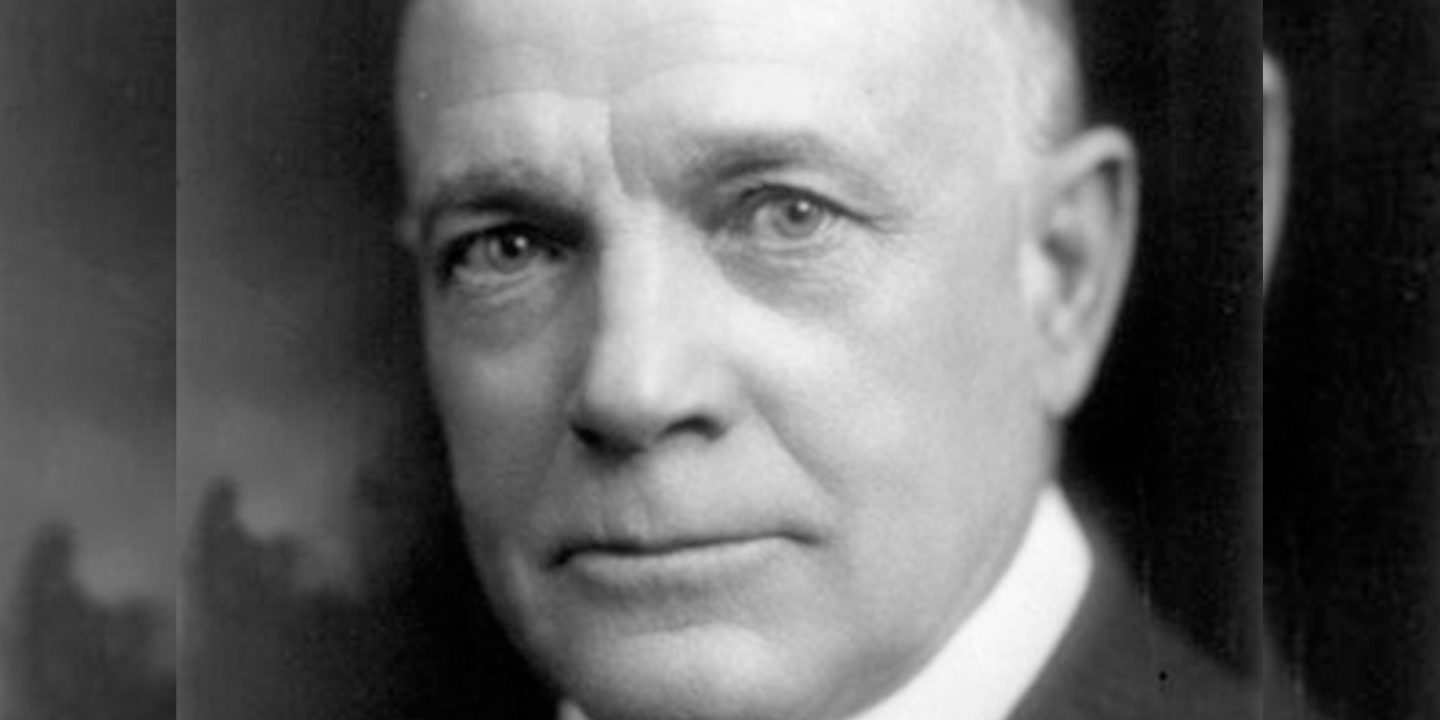- Home
- People + Places
- God’s Battle Axe – Billy S ...

William Ashley Sunday, popularly known as Billy Sunday was possibly the most famous evangelist in the early 1900s. His ministry resulted in about 1,250,000 conversions to Christ. He was born on November 19, 1862, near Ames, Iowa, to William Sunday and Mary Jane Sunday (nee Cory).
Young Billy never saw his father, who had enlisted in the Union Army in August and died of pneumonia in an army camp a month after his son was born.
Billy’s mother later remarried, but her second husband was a drunkard who deserted the family. In 1874, she sent Billy and one of his older brothers to the Soldiers’ Orphans Home in Davenport, Iowa. There the boys were trained in hygiene and manners and given some religious guidance. They also received a good education and the chance to participate in games and athletic events.
In 1876, when his brother turned 16 and was sent home, Billy also returned to Ames. He went to work for his grandfather, but after they quarrelled, the youngster moved to nearby Nevada, Iowa. There he found a job that gave him room and board, and he enrolled in the Nevada High School.
Billy played for the local baseball team and ran the regional foot races, earning a reputation for his speed. In 1881, a running team in Marshalltown, Iowa, recruited him, and he moved there before the end of his senior year in High School.

Billy found a job in Marshalltown and soon joined the town’s baseball team along with the running team. In the fall of 1882, Marshalltown beat a stronger Des Moines team, 15-6. Billy played the left field, slugging three doubles and scoring four runs. This feat earned him an invitation to train with the Chicago team in the spring of 1883.
He was later signed on as a substitute outfielder by the club’s manager, Adrian “Cap” Anson. After several seasons with the Chicago team, he was sold to Pittsburgh Alleghenys. He also met and married Nell Thompson at this time.
After he settled his 1889 contract with Pittsburgh, he and Nell took a wedding trip before returning to Chicago. He began taking Bible classes at the Chicago YMCA and was such an eager student that he was offered a job there.
He accepted the part-time position, continued his Bible study and started leading prayer meetings. He continued holding religious meetings at the Pittsburgh YMCA when he returned in the spring, and as the season went on, he spoke at YMCAs in other cities when the team was on the road.
In early 1893, the well-known evangelist, J. Wilbur Chapman came to Chicago. He was in search of an assistant for a series of revivals in the Midwest, and the YMCA recommended Billy. For the next three years, he accompanied Chapman, learning the mechanics of holding revivals and honing his pastoral skills in prayer meetings and personal visits. In late 1895, Chapman accepted a pastorate in Philadelphia, and Billy went out on his own. His first revival meeting was in Garner, Iowa, in January 1896. He spent the next dozen years holding revivals in the rural Midwest.

Billy displayed a natural gift for rhetoric, especially in creating realistic images and catchy descriptions. Retaining his athletic energy, he was in constant motion when he preached, using acrobatics and dramatic movements to illustrate his points. Because of his baseball past and his physical preaching, along with his straightforward approach and down-to-earth language, Billy was able to attract large numbers of men to his revival meetings. He embodied a man’s religion, and men understood his message.

In 1902, the Presbyterian Church ordained Billy a pastor. Although he was officially a Presbyterian, his ministry was always nondenominational, and he did not emphasise theological matters. He said of his style of ministry, “I am an old-fashioned preacher of the old-time religion that has warmed this cold world’s heart for two thousand years.” He preached a simple message of temperance and salvation through Jesus Christ, an accessible Christianity expressed in the uncomplicated language of America’s heartland. “I don’t use much high-falutin’ language. I learned a long time ago to put the cookies and jam on the lowest shelf.”

Billy’s stature and importance remained strong throughout World War 1. In the 1920s, his influence waned, and his later revival meetings were held in smaller cities, with smaller crowds. However, his sermons on salvation, temperance, and personal decency still commanded attention. He continued preaching until a week before his death. Billy died of a heart attack on November 6, 1935.
Though he never attended a seminary, it did not stop Billy from being one of the most sought-after evangelists in the USA. If he had a theme for his ministry, it would be that he would always speak against the sins associated with alcohol, illustrated in this quote of his, “Whiskey and beer are all right in their place, but their place is in hell.”
Billy’s life and ministry showed God’s providence in action. Even the sad event of his father’s demise and the drunken stupor of his stepfather were used by God to prepare him for ministry. It was not by coincidence that he stood against drunkenness and preached temperance all his life in ministry. He saw the damage alcohol caused his family and the broken life of his stepfather.
What has God allowed us to go through to prepare us for ministry? Have we allowed ourselves to learn from these situations? Nothing is wasted in God’s economy. We need to ask the Father to help us not to waste our pains and tears.
****Culled from Billy Sunday, Society for American Baseball Research, https://sabr.org
